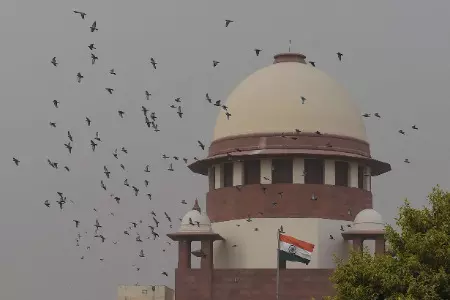What prejudice will be caused if bank provides hearing before classifying account as fraud: SC

New Delhi: The Supreme Court on Tuesday asked what prejudice would be caused to banks if they provide an opportunity of hearing to borrowers before classifying their account as fraud.
A bench of justices J B Pardiwala and K V Viswanathan observed that at least an opportunity be given to a person whose account is to be declared as fraud.
The bench's observations came while hearing a petition filed by State Bank of India (SBI) challenging an order of the Calcutta High Court in a matter relating to declaration of an account as fraud.
Solicitor General Tushar Mehta, appearing for SBI, referred to a March 2023 verdict of the apex court and said the decision should not be read or understood to convey in so many words that oral hearing or personal hearing is mandatory.
In its 2023 judgement, the top court had said banks should provide a reasonable opportunity of hearing before classifying a borrower's account as fraud.
Mehta referred to a circular of the Reserve Bank of India (RBI) dealing with how the fraud is to be detected.
He said one of the stages in declaration of the fraud is forensic audit which is to be conducted by forensic auditors and during this, the account holder is always associated with the auditors.
Mehta said thereafter a notice is given and the account holder furnishes his written reply based upon which the decision is taken.
"If show cause is to be issued, if reply is to be called for, if reply is to be looked into, just make us understand what is the problem in giving him a personal oral hearing. This is the first question," the bench said.
It then asked, "And if given, it would cause what prejudice to the concerned bank? Please make us understand."
It said over two years have gone by since the apex court's 2023 judgement and so many banks must have issued show cause notices in such matters.
"Why State Bank of India has some problem with giving a personal hearing or oral hearing," the bench asked.
Mehta said no bank gives personal hearing.
He argued that banks may have to encounter situations by which it would not be possible to afford oral hearing or personal hearing to the parties concerned.
He said at times, giving of personal hearing may defeat the very purpose of declaring the account to be a fraud account.
The top law officer also said the court may consider hearing the RBI in the matter.
Senior advocate K Parameshwar, appearing for the respondents, referred to the 2023 verdict and said it was not enough to call for the reply to the show cause notice and decide the matter.
The bench asked the parties to file their written submissions along with the case law they propose to rely upon.
"We also want the bank to highlight... the peculiar contingencies which they may have to encounter and why such contingencies should exempt to bank from giving personal hearing," it said.
The bench said presence of the RBI was also necessary in the matter.
It asked the SBI to make the RBI a party respondent and posted the matter for hearing on November 18.
Mehta said the RBI's circular, which dealt with how the fraud is to be detected, was challenged and ultimately, the top court had upheld it in 2023 with a clarification that an opportunity be given to the account holder before declaring the account as fraud.
In its 2023 verdict, the top court said the principles of natural justice demanded that the borrowers must be served a notice, given an opportunity to explain the conclusions of the forensic audit report and be allowed to represent before their account is classified as fraud.
"Consistent with the principles of natural justice, the lender banks should provide an opportunity to a borrower by furnishing a copy of the audit reports and allow the borrower a reasonable opportunity to submit a representation before classifying the account as fraud," it had observed.
The top court had said the decision classifying the borrower's account as fraudulent must be made by a reasoned order.
The judgement was delivered on pleas relating to the Reserve Bank of India (Frauds Classification and Reporting by Commercial Banks and Select FIs) Directions 2016 which were challenged before different high courts primarily on the ground that no opportunity of being heard is envisaged to borrowers before classifying their accounts as fraudulent.



